#but man... hoyo knows how to make pretty men............
Explore tagged Tumblr posts
Note
Ayo question, but do you play hsr? If so I must know your favourite character and fav path
I don't, i only know characters and general plot points lmao
BUT. But if you're asking my faves, then here's the lil shits that almost made me download star rail


Thats what happened in penacony right?
#no i dont want to play another gacha game on top of genshin#i dont need to be pissed off by shit plots double time#but man... hoyo knows how to make pretty men............#lyss' sketch#honkai star rail#hsr#hsr aventurine#hsr sunday
348 notes
·
View notes
Note
Lost-nut enlightenment sjdbbdhdhd I'm fuckin wheezing but you're so real for that
If hoyo didn't want me to Dom him then too bad, any male character can be Dommed if you're not a coward.
Deadass when I saw his leaks and saw the headphones I was like "oh, he's probably partially deaf and those are in-game's equivalent of hearing aids, that's pretty neat. He seems like he's either going to be overly friendly or I'm going to want to punch him type of personality"
And damn hoyo tried to portray him as this cool lone wolf scholarly guy who wants to understand everything about Teyvat that's aloof and blunt and a majority of the fandom looked at him (me included), especially after he mentioned that his headphones have noise cancelation, plus the stories about him going the Akademiya as a little kid and went "autism/neuro divergent havin ass 🫵😶" and they're so right for that. Literally nothing about him is neuro typical and I think it's neat.
He's such a dork, bro thinks he can hurt my feelings by being blunt he's not ready for me to take one good and psychoanalyze him. This is how we flirt, others are horrified but this man is literally the horny grip meme because I just know he'd be turned on by you doing something that shows off how smart you are.
I just remembered that his headphones can record lectures.
Nini, imagine recording JoI for him on a separate headphone set, general dirty talk, etc for when you gotta be away because you just know he'd be too stubborn to openly admit that he misses the sound of your voice.
He's so pathetic bless we really eating good
I'm trying not to spam your inbox with the rambling of madman but I'm just so happy to have fellow Doms to gush about subby men with since it's hard to find each other
-🐇
Nah it’s alright, I don’t mind. Also I noticed that was a typo- I wanted to write post-but enlightenment Ahahhahah
But the thing with the headphones? 10/10 would write. I’ll do it once my kinktober stuff are done. Imagine recording his own noises during smexy time without him knowing, and making some alternations to his headphones so that we can change whatever he’s listening to something else.
Then just jumpscare him with his own lewd moans and whimpers. At first he’d be so confused, like who’s this weird ass dude with the high pitched voice of a girl? Is it even a guy? Until he hears your voice, and the words you uttered were so familiar.
As soon as he notices that these sounds were in fact, he himself, god the embarrassment and lust swelling inside him would be 📈📈
I think he’d blush and smirk to himself, scaring basically any poor souls who had the unfortunate fate of witnessing such a scene.
#nini!rant#🐇 anon#sub genshin impact#sub genshin#sub alhaitham#alhaitham x y/n#alhaitham x you#alhaitham x reader#alhaitham smut
170 notes
·
View notes
Text
random but yes my final thoughts on all the new natlan chars with a conclusion in the end lmao
mualani .

i love her she's so cute help i knew i would love her ever since her first appearance i literally can't wait for her drip marketing tmrw
the tattoo typa things on her skin help?!????!??!? beautiful?!!?!!?!??
hydro women>>
~
kachina .

SHE'S ADORABLE HELP
i love all the genshin children sm they're so precious i swear even dori /p
i love her hair a lot tho
~
kinich .
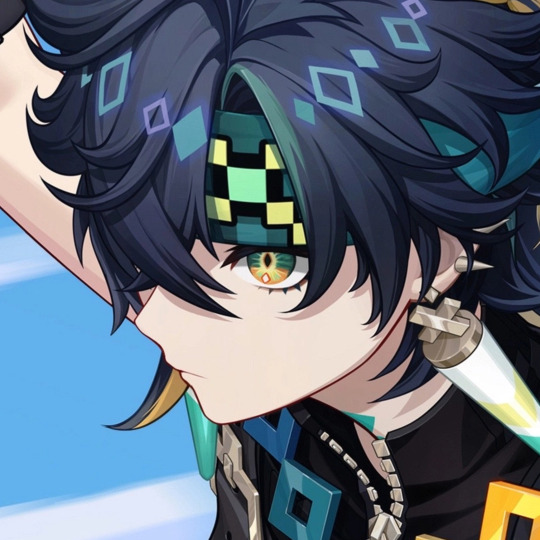
LOOK.
MY FAVORITE CHARACTER(scara) HAS COMPETITION NOW.
I WILL REFRAIN FROM SAYING TOO MUCH BUT BASICALLY I LOVE HIM. (and ajaw lmfao that little thing about to become like boothill)
~
citlali .

ANYWAYS LOOK AT HERRRR
she's so cute i love her
something about her reminds me about hsr fu xuan but either way she's probably the cutest char from the trailer imo^^
~
xilonen .
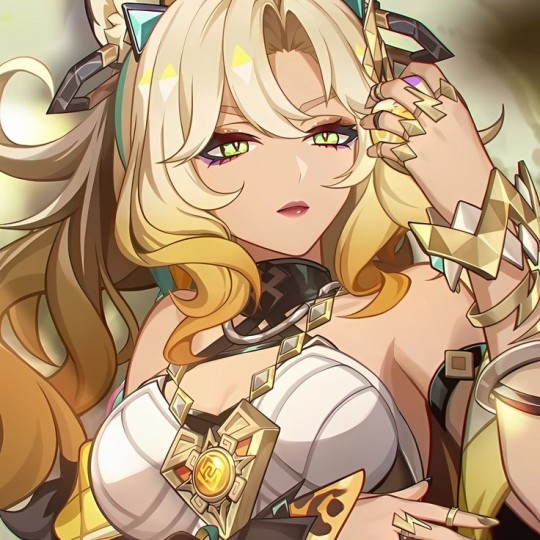
help me i can't do this anymore the women are literally top tier(offtopic but she's almost identical to one of my ocs which i won't rant about rn lmao)
THE MAKEUP AND HAIR???? MY FAVORITE WOMAN FROM NATLAN?????????
SHE'S THE DEFINITION OF SMTHN LIKE "in war rn but at least i gotta look hot" AND IT'S TRUE
~
iansan .

somebody help why did we only get like 0,6sec of her😭
still i'm very excited for her
for the design at least since i truly have no idea of her personality lol
~
chasca .
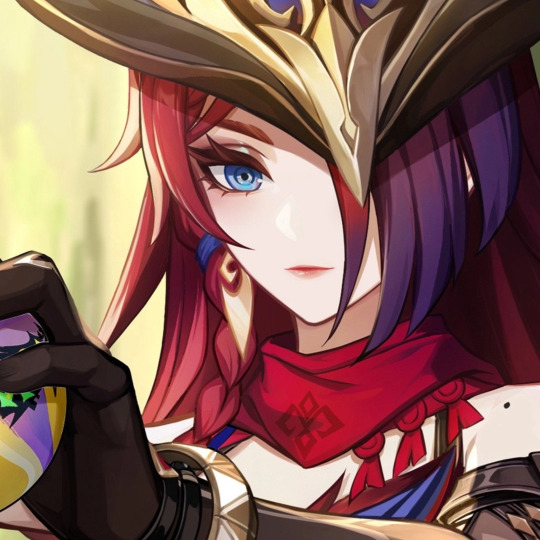
i love this woman already
also the mole she has on her shoulder bro i have the one on the same place
cowboy vibes from her btw??
~
capitano . and ororon(olorun?) .
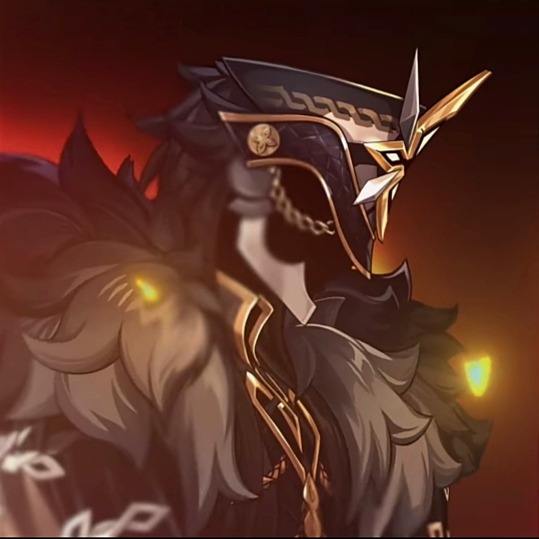

about capitano; first, i'm very excited, and second, i wish he said more than just "hmph."
about ororon(olorun?); heard that he turned out very bad based on who he references and even his name is very messed up i'm pretty sure?? basically the same situation that happened with candace/kandake EITHER WAY i'm excited to see him more and like will he be the first tall male anemo help lol i like his design
can't wait for them although i have other preferences for now
~ ~
mavuika .
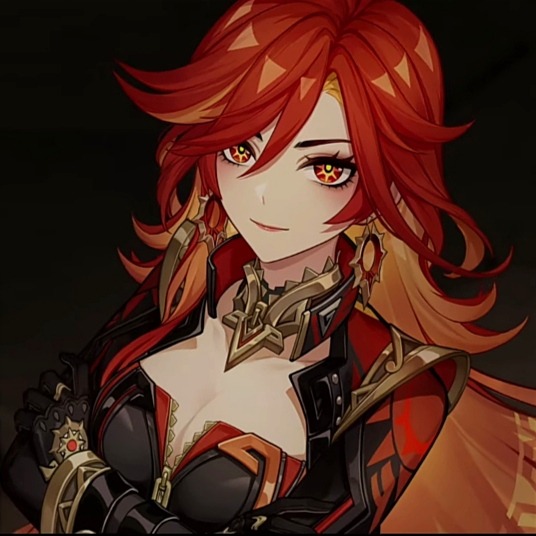
THANK GOODNESS SHE'S NOT LIKE THE LEAKS
i absolutely love her design and everything sm about her literally please don't die and yeah she's now my third favorite archon along with furina and nahida
also despite the outfit not being revealing and all and literally a 10/10, i have a feeling she's gonna get very sexualized because of that zipper😭
~
in conclusion, i absolutely love the characters.
the only problem is that there's not really many dark skinned characters aside from iansan and kinda tanned mualani and xilonen ig
here's a link to a petition to try and stop hoyo from making the skin colors as light as they always do😭 i personally didn't look into it too much at first because of which countries the nations were based off of, but now this is supposed to be africa/south america and there's not really much skin representation
yeah, sure there's representation, but not of skin color other than iansan(and mualani and xilonen too)
finally, i think that all the designs are truly 10/10 it's just the skin colors bothering me aka hoyo's typa racism due to them being a chinese company. again, don't get me wrong, shitty company and i hate racism(as a white person) but the characters are great in all honesty and all the other types of representation are great^^
~
(good thing i personally don't play the game because of my phone storage and i'm just in the fandom from it's release bro and i love the lore so that's how i know the characters and story in the first place)
~
update:
my honest thoughts on the drip marketing(no pictures)
KACHINA IS ABSOLUTELY ADORABLE SHE'S SO CUTE AND PRECIOUS TO ME THAT'S IT(what animal is she supposed to be btw??)
MUALANI LOOKS SO PRETTY!!!!!!! I LOVE HER SM PLUS HER SHARK IS ALMOST AS CUTE AS HER
KINICH JUST LOOKS SO GOOD. I LOVE THAT MAN. I AM NOT USED TO LIKING TALL MEN AT ALL BUT HEAR ME OUT...........
I LOVE ALL OF THEM FR I'M SO EXCITED FOR MORE CHARACTERS
~
(is it just me but do they look like they all have the same skincolor on their drip marketings???? like are kinich and kachina a bit darker OR is mualani lighter than she looks???)
#genshin#genshin impact#natlan#mualani#kachina#kinich#citlali#xilonen#iansan#chasca#capitano#il capitano#ororon#olorun#mavuika#murata#genshin natlan#genshin impact natlan#k'uhul ajaw#ajaw#can't wait for the drip marketing tmrw i will literally add my honest thoughts here
51 notes
·
View notes
Note
I'm so glad to see people point out how bad genshin has gotten. we have had 2 (TWO) male characters this whole region. and they just killed off the captain??? I'm PISSED!!! all the female characters suck too. they power creep existing characters and mechanics, their designs are so weird and out of place from genshin, their characters are so shallow etc.
I'm genuinely so surprised to see older players stick around. their hard earned artifacts, weapons, and attention to detail feels like it was ran over by mauvikas motorcycle. let's talk abt muavika, she's an expensive xiangling replacement. usually new archons shake up the game, she doesn't. yea she can fly, so can wanderer, chasca, kinich, etc, she can ride on water, most cryo units can too, and furina and mualani and Mona kinda, she has ok Pyro application, so does Thoma, xiangling, dehya, u get what I'm saying?
THE FANSERVICE OMG. if honkai has hot men, genshin is the other side of the spectrum. mualani has the weakest excuse for clothes, xilonens and citlalis jiggle physics gotcha ogling, chasca is wearing... that... and muavika has a zipper going up her cooch 😭😬 it's not hard to see how sexualixed all of them are.
I find it hard to believe that they can't make any more dudes. both guys we do have look too much like teens. I don't even wanna get into the race problem cuz 😬😬 everything that can be said already has been.
meta has been better, we have a geo kazuha now. yay. everyone else has been a main dps, subdps for nightsoul or a niche support. other than xilonen, I wouldn't pull for anyone else metawise. we desperately needed a better shielder, we got a wonky 5 star Layla. zhongli has been needing a buff desperately, if hoyo thinks he is the ceiling for shield strength. maulani, kinich, and chasca are all main dps, I don't even know what ororon and kachina do.
exploration is fine, there are chests everywhere, maybe to distract the players who find the dragons mechanics to be chunky and annoying. the region really wants you to have natlan characters though, and if you don't, you struggle a bit more. it looks pretty though, the art direction and landscapes are beautiful. plenty screenshots to squeeze in with the 5000000 gb game. I don't wanna get into the story, this ask has gotten wayyy too long
anyways, thanks for coming to my Ted talk. hopefully they do shneznaya justice.
get it
just(ice)
ha ha ha I'm so funni
oh my god you're literally so correct about everything and im so mad about it. like the racial issues first and foremost made me immediately go 'well guess im not spending anymore' which i havent since because the only character like you said thats been interesting at all has been xilonen. she, kachina, and mualani were the only characters in natlan i actually liked the designs of (well other than the captain but hes not even actually from natlan). and even then LIKE BRO MY SUSPENSION OF DISBELIEF BRUH!!!!!! like people are like 'oh it makes sense lore wise oh its ancient dragon tech' WELL IT DOESNT FUCKING LOOK LIKE IT!!! WHY DOES MAVUIKA HAVE A YAMAHA!!!! WHY DOES EVEN MY FAV XILONEN HAVE A TURN TABLE LIKE I CANT DO THIS AAAAHH. The exploration and world is amazing because it always is and I saw this poster the other day who fuckin. GRINDED my gears over on reddit who was like 'people hated this regions story?' and then posted a bunch of beautiful natlan screenshots like BRO YOU AND YOUR STRAWMAN ARGUMENTS YOU COME HERE!!!
I think if I personally talk about the fanservice I'll pop a blood vessel. Anon if you have not seen the leaks for 5.4 you are in for a TERRIBLE surprise when they show the next character and I am so so SO sorry for the misery you will endure
Snezhnaya... Give me Dottore. Give me Panatalone. Give me the fucking short old man hoyo or I will start sending thousands of dollars of manure to your offices to be dropped off. God help us all
#sophie speaks#sophie answers#'you shouldnt threaten da wei's life over this stuff'#well maybe he shouldnt have come out said that they were going back to their roots and cried on live stream for the world to see#anyways im not threatening murder just like some extremely displeasing experiences
10 notes
·
View notes
Text
okay, at last, 3.1 thoughts under the cut
i have been well fed this patch, for sure
anaxa & his whole situation is so very fascinating to me and i cannot wait to learn even more about him in the upcoming story. i'm definitely looking forward to diving into things and cooking on him a little now that i've actually had in-game content for him. i'll be pretty canon-strict with him until things are concluded (to avoid another 'gallagher situation', as i like to call it) but then we'll see how things go. that reveal at the end, for example... man, man. i can't wait to unpick that.
mydei. MYDEI. my man, my beloved. god, and to think i wasn't sure if i'd like him all that much before 3.0 dropped. honestly this patch has made me so mad that i have to skip him bc my love for him is insane right now. i was very on the fence about him taking the coreflame (and i remain bitter about how it seemed like they were trying to force him into taking it at the start, given he'd said he didn't want it) but i'm very happy that it happened the way it did - that he grew to want it on his own terms, in his own time, and that it was the right thing to do for him and not just because he was "best suited" for it or other people wanted him to take it. and everything with the kremnoans, ending the dynasty, freeing them from the cycle he's wanted to stop for so long..... i'm an emotional wreck
and since we're on the subject of me being an emotional wreck, literally every interaction between him and phainon just ramped up the emotions every time. theirs is such a complex and beautiful dynamic that i cannot get enough of. the banter, the (stupid, so stupid) competitions, the dropping of facades to actually exchange meaningful thoughts and perspectives, talking about their homelands together, mydei telling him exactly how to kill him- god. GOD. no one can tell me this isn't one of the most important connections mydei has in okhema. that he would trust phainon not only with that information, but with actually following through with it if it comes to that. the faith he has in him, that he can entrust his people to phainon. i'm fine. I'M NOT FINE AT ALL
quick addition here just to say: i love these two across a spectrum of dynamics, especially because of this patch and the growth we've seen develop between them. regardless of how you view them, phainon is an important person in mydei's life. i'm sure there are whole sections of the fandom that will ignore the complexities of their characters and their dynamic bc "heehee hot men together" and that is so very, very tragic to me. they are so much more than that, and if i was going to ship mydei with a phainon, it would have to be with someone who appreciates them on the same level, and not just bc they're the "new" m/m ship of the fandom. i know this doesn't fit really into 3.1 thoughts but given the way i talk about them i just wanted to make that clear. when i say i love them, when i say i'm an emotional wreck over them, it's out of appreciation for what they've developed, for that trust & understanding of each other that is implicit in every interaction between them. could i see myself developing a ship with someone? sure, i never say never without good cause to. but equally i'm perfectly happy to develop something so deeply, beautifully platonic.
ANYWAY, moving on to tribbie. god that was also an emotional rollercoaster. from the freaky doll nightmare situation to trianne's sacrifice & 'death'(? i'm squinting, hoyo), what a fucking wild ride that was. getting to explore that glimpse into the past was very interesting too. getting to see who they were before they were three, understanding a little more of why they chose this path. i loved it all.
i'm not sure how i feel yet about TB (potentially?) taking on oronyx's coreflame. it's bordering on the 'saviour of everything' trope which is prevalent in these games and whilst, yes, that's kind of the point, i know, it just.... idk man, it feels weird. don't get me wrong, it makes sense given we can use the reverse-time powers and everything, and given mem, but... i guess i'll just wait until the next update to pass full judgement on the subject.
overall, i very much enjoyed 3.1. i've enjoyed amphoreus as a whole much more than i enjoyed penacony - yes, there's still a lot of yapping (that whole section of switching perspectives constantly just to have conversation after conversation without a break in between was a bit much even when i'm interested in what's being said) but that was outweighed by the general enjoyment of the story itself. and the cutscenes have continued to be absolutely fantastic. they went real hard on some of them (mydei, my king-) and the visuals are just. chef's kiss.
a pity we didn't get anything really from the other side of things, but i suspect we'll go back to that in 3.2 if only in part. & i was worried they would change too much because of the complaints about 3.0 but actually, it wasn't that bad. it definitely felt a bit smoother and definitely didn't take twice as long to get through areas bc they're swarming with enemies, so that was definitely a good decision on their part. i didn't mind the puzzles being part of the story in 3.0 but i can understand why they took some of them out and made them optional treasure-finding puzzles instead for this version.
idk guys, it's just nice to actually enjoy a main story quest and want to finish it quickly out of eagerness rather than a forced necessity to avoid spoilers bc of the rush culture surrounding these games. amphoreus may not be everyone's cup of tea but i'm thriving on it and i can't wait to see where the story goes next
also pls, hoyo, give me more castorice lore like... yesterday-
#;forever yelling into the abyss (ooc)#// hsr spoilers#( be prepared for a long and rambling post )#( my thoughts may not be fully coherent bc it has been a Day )#( but. here they are anyway )
0 notes
Text

2.1 update, and a dream come true.
Happy 1st Anniversary to Honkai Star Rail!
I'm so glad the update came a few days before my flight or else I'd be distracted from everything. Though, I already am distracted because I should be packing my stuff right now. I'll leave that to me in the future.
As someone who used to play Guns Girl Z it's nice to see how far miHoYo had come, especially HOYO-MiX. While I couldn't say much about the story (I unfortunately am a dialogue skipper), I've always loved their music. Sometimes I would boot GGZ up only to go to the OST section and listen to my favorite tracks for hours. Even after I dropped Genshin Impact from burnout, I still find myself checking out OST of newer updates from time to time. Heck, whenever my brain gets too loud at night, I would calm myself down with Liyue or Dragonspine playlist. Yet somehow, it's different when it comes to HSR.
But before that let me slide one of my favorite tracks from GGZ here ;
youtube
There is something about older music that sounds simpler yet enjoyable when compared to what we usually hear now. A banger from the past. Not saying one is better than another, of course. HOYO-MiX always delivers.
HSR OSTs are really good. I honestly don't know why it didn't hit me as hard as the other two games. There is only one track so far that strike my interest enough to make me hunt it down on YouTube so I can loop it while laying on my bed as I stare at the ceiling (the one named "Stade du Miroir" if you're curious). I've also said above that I'm a story skipper. Then what exactly keeps me on hook? To be fair, I've always felt neutral about HSR.
Until he arrived.

Look at this man.
A beauty bestowed upon Xianzhou Luofu.
I was intrigued.
From that day on, my goal was set.
Meta or whatever.
If he isn't E6 I'm not pulling for anyone else.
It was a miracle that I managed to get Luocha to E2 on his first banner. I couldn't remember how much I pulledーNo, I'm not a whale. I'm but a little dolphin who purchased a couple of monthly passes. Welt also came home on one of the pulls along with Luocha. Maybe he's trying to stop this pretty blonde from reaching me. After all, his past encounters with similar looking men didn't end well. I had a feeling I got the 3rd Luocha on a solo a day or two before the banner disappeared too.
Charming new characters appeared left and right as the story progress, but I stayed strong (I didn't. I accidentally got Blade while trying to build pity, tried for Argenti and stopped before I hit 50/50 then lost about 50 pulls to Ratio LC). Sunday and Aventurine worried me because oh boy, how would I be able to resist those two. Thankfully, as I'm writing, Luocha's rerun came together with Acheron. I would've lost it if Aventurine was first.
Long story short, this is the final result after around 250 pulls.

I have 21k stellar jades left, so I may be able to save enough for Aventurine (or Sunday if he is confirmed to be playable). Though, I'll have to wait for guides to help me collect chest because my head still hurt after completing the main story. Penacony maps make me feel dizzy and somehow the main story makes it even worse.
Now I have an excuse to stop playing HSR for a few days so I can continue preparing for my flight.
Sigh...Can I skip every process and just warp there?
#mepple wants to write#never gonna e6 anyone again#i need other 5 star characters#go pack my bags already#actually imma sleep#it's 3 in the morning
1 note
·
View note
Link
THERE’S A CERTAIN BRAND of criticism reserved for overstuffed, bizarre stories — it consists of the critic throwing up her hands in despair and saying: “Sure, whatever, why not?” It usually has to do with a lack of narrative cohesion or consistency — but mostly it’s about the element of surprise. Whodunits rely on surprise by flouting expectation: when the audience least expects something, swerve. Poke the bear after insisting it’s harmless, then reveal it is the murderer. Avant-garde works rely on surprise by flouting tradition: baffle, provoke. Poke the bear, make it dance and tell you a campfire tale about a murderer with a heart of gold. Two men called Vladimir and Estragon wait, forever, by a tree, and it’s probably much ado about nothing? Charles Kinbote pretends to care about a long poem, but really he cares only about himself, and some country named Zembla? Sure, whatever, why not?
The Argentinian writer César Aira — I bought all 16 of his English-translated books, including his most recent, Birthday — is precisely the sort of writer to elicit that reaction. Take a centuries-old epiphany about a pirate treasure by a translator who appears at the exact location, and is immediately made rich. Or a headless dog who, without any semblance of a brain or any kind of nervous system, survives to adulthood. These are Aira stories, and if I’m being totally honest, they don’t strike me as particularly avant-garde. Most things that actually happen in an Aira story, in the sense of a plot, happen pretty quickly. The rest is digression, mostly Aira straight-up messing with the reader. On the basis of sheer experimentalism, there’s no Pale Fire–like flouting of formalism here. The prose is candid. There’s always some narrative. On the basis of grand metaphor, again, no dice. If you’re waiting to understand something, you won’t.
But that’s not true. Aira isn’t without tradition or precedent — he’s just hard to pin down. The provocations are too capricious; the subversion is undercut instantly with a cruel reminder of reality or lack thereof. The closest tradition is probably Dadaism in its insistence on nonsense verse. Then again — at least according to a profile in The Nation — Aira’s destabilizing of reality is supposed to be deeply political, the works of a man who was “a young militant leftist, with the notion of writing big realist novels.” But at least from the translated works that precede Birthday, there is little narrative coherence to his radicalism. If there is, it’s like an editor returning a draft with the sentence, “TK TK capitalism TK TK.”
Who says that’s a bad thing? There’s a big show of laziness, too, which is very much a conventionally bad thing (Aira claims to improvise entirely and never rewrite). In Varamo, the titular character contemplates the disbursement of his salary in counterfeit money:
After all, Panama was a young nation, and situations of this kind require a minimum of history. It was complicated enough to establish the laws that govern the legal printing of money, an operation which, in its early stages, is bound to resemble counterfeiting. So if he were caught trying to use fake money — as he was sure he would be — the case would set a precedent; the sentence and the legal concept would have to be invented, made up from scratch, given a comprehensible form and surrounded with discourse to make them plausible. All of which would involve intellectual and imaginative work, but that didn’t make the prospect any brighter for him.
Is this also what Aira the writer is doing? In the very first paragraph, the narrator promises us a book about how Varamo wrote a celebrated masterpiece of Central American poetry in one night. We never get that book, so it doesn’t matter.
Or actually, maybe it does matter, because on the night in question — before the writing begins — Varamo meets two spinsters who smuggle golf clubs and pontificates that for them, “the national was a categorical imperative,” the same as for printing money, even counterfeit money. A little detective work: Varamo the character, a hapless bureaucrat, writes his masterpiece in 1923 when Argentina was still one of the richest countries in the world (soon to change in the wake of a military junta taking power in 1930). It makes some narrative sense that the novel seems so very anxious about the black market and counterfeit money (in 1920s Argentina, an abundance of counterfeit money was quite real). In which case the plot is the digression, and everything else is vital.
So I suppose it is political after all: the idea that the bizarre is also real, from the writer who once chastised other Argentinian writers for being too unconcerned with the country’s “social and economic problems.”
How does one tell the difference? Conversations is easy. The post–Cold War United States manipulated the lives of people in ex-Soviet states, causing reality itself to having a strange in-between-y status. Others are harder. In The Literary Conference, giant silkworms engulf and destroy a whole city, by way of a cloning machine. In The Little Buddhist Monk, a suicidal Chinese pony imported to Korea jumps off a pagoda, because it has no knowledge of the toxic Korean herbs it would have otherwise required. In The Miracle Cures of Dr. Aira, Dr. Aira tries to cure cancer using “screens” that include or exclude everything in the universe: “[H]is right hand […] divided up the joys and sorrows of Muslims; his left was pulling a little on another screen that excluded too many apples.” In The Seamstress and the Wind, a woman drives a car “as light as a yawn” which can contain “only one not very fat person […] and only if they were tightly-folded up.” It’s going somewhere, or nowhere. It’s a mystery or, a soda bubble, or a magnet car. It may or may not occupy space. “The proverb says mystery does not occupy space,” Aira writes. “All right, fine; but it crosses it.”
If that isn’t the writer’s version of throwing his hands in the air and saying, “Sure, whatever, why not,” I don’t know what is.
¤
But there’s a pretty major problem with all that I’ve said thus far, though it’s the consensus view — and that is the idea that Aira is somehow colossally enigmatic. Alena Graedon in The New Yorker calls Aira’s novels “difficult to classify.” K. Reed Petty in Electric Literature insists that the reader not “try to understand.” Aura Estrada, for the Boston Review, wrote that Aira’s work showed that “the literary enterprise […] [is] pregnant with possibilities.”
The problem is that those pregnant possibilities do indeed mean very real things: both for Aira and fellow Latin American absurdist writers with whom he shares a tradition. The literary scholar Ericka Beckman reminds us that what people find colorfully absurd about Latin American fiction is often very real. A Latin American dictator in Gabriel García Márquez’s The Autumn of the Patriarch sells the entire Caribbean Sea to the United States; the body of water is subsequently moved to the Arizona desert. But it’s the actual privatization of ordinary things in Latin American countries that lend the story its gravitas. “In 1999,” Beckman writes, “the Bolivian government signed a $2.5 billion contract to privatize the city of Cochabamba’s water supply.” Under the proposed agreement, a San Francisco–based consortium “was to own all of the city’s water resources, even the rain that fell from the sky.” The tradition also extends to Borges and Bolaño, the latter of whom called Aira “one of the three or four best writers working in Spanish today.” But whereas Bolaño is considered to have written some of the most innovative critiques of globalization and fascism, Aira is merely “not meant to be understood.” If that’s all Aira means to us, then we’ve lost something of immense value.
Indeed, much of Aira can be construed as a new articulation: not an idiosyncratic style from an exotic backwater, but something creatively new, a giant middle finger to the Western literary enterprise. In The Proof, for instance, a teenage lesbian couple (“Mao” and “Lenin”) try to seduce a shy girl and subsequently commit a violent act in a supermarket as a “proof of love.” According to Latin American literary scholar Héctor Hoyos, The Proof is about “destabiliz[ing] sexual orientation” and the inherent violence of ordinary commerce in the supermarket. That’s reasonable, and strikes me as a far better way to understand Aira than claiming he’s not meant to be understood.
How to explain the gonzo story that is How I Became a Nun? The story is narrated by a six-year-old child (boy or girl?), and begins when the father treats the child to ice cream for the very first time, only to become incensed when the child despises it, tries it himself, finds it revolting, and violently kills the ice cream vendor. Soon after, the child reports that “my body began to dissolve … literally … My organs deliquesced … turning to green and blue bags of slime hanging from stony necroses … bundles of ganglia.” Turns out there is a wave of lethal food poisoning, by way of cyanide contamination, across Argentina and neighboring countries.
The boy/girl is, as are many of Aira’s characters, named César Aira, and the child’s affliction affects not just the body but the telling of stories. It’s all very paradoxical; insistent that language is “anti-mimetic” and bears no resemblance to reality. In Conversations, a story-within-other-stories, the narrator immediately digresses: “[A]n aside: a memory can be identical to what is being remembered; at the same time it is different, without ceasing to be the same.” This is all the stuff of Barthes and Derrida, the idea being that nothing in the novel is real (or even helpfully un-real). If Aira really is Barthes and Derrida in plot form — poststructuralist children’s books, imagine that! — then thank goodness that these stories are so fun. With a lesser writer the hand-wringing would never end.
So, let me contradict myself again. Once you get the hang of it, Aira’s politics aren’t particularly difficult to suss out. Most of the time, when Aira says something, you should probably just believe him. One of his major themes is: People get these ideas, and it doesn’t really matter if they are true. A second major theme is of Authorial “exclusion”: a litany of unreliable narrators wax lyrical about closed loops or circles in narratives (Barthes would be proud). A third: If we wrap something simple into something indirect and symbolic, people are drawn in, even though we’re cheating. Boy/girl César decides to deceive a doctor: “The aim of my ruse was to make her think I had something ‘difficult’ to express.”
Let’s do Aira a favor and dispose of Barthes and Derrida because, simply put, we don’t need them. I’m not scoffing at literary theory. I simply think it makes more sense to privilege Aira’s own words. Here’s a stronger case. Every so often, you find something that has to be Aira the writer speaking directly to the reader. In Conversations, the narrator laments the plot weren’t more outlandish: “That […] would have resulted in a much more interesting story, right?” In How I Became a Nun, Aira is baffled by a singer, broadcast on television, who cannot sing: “[To] the Tone Deaf Singer herself … perhaps she is still alive, and remembers, and if she is reading this … My number is in the telephone book.”
I’m fairly certain that Tone Deaf Singer is really out there somewhere. I hope she got in touch with César Aira, and that they talked.
¤
So much is made of Aira’s oddities, plot twists, and diversions, but I want to convince you that it’s the emotional effect that should make you stick around. I read Ghosts last of all, and I was entirely unprepared for it. Shorn of quick swerves, Ghosts is perhaps his most poignant. Set at a construction site for a bourgeois condominium, the world-building is exquisite; no other translated work of his is as detailed or as tremulous. There aren’t surprises in the manner we’ve become accustomed to: the eccentricities feel familiar; the philosophizing logical.
Set over the course of a New Year’s Eve, Ghosts is only somewhat about ghosts — the ones that the workers and the immigrant family squatting at the site see, but the families soon to move in don’t. It’s a book preoccupied with the juxtaposition of the rich and the poor, while also fixated on the sadness and peril in the lives of an enormous cast of characters, slowly spiraling down to focus on the oldest daughter of the central squatter family.
It is uncommonly gentle and empathetic for Aira. But then it was with Ghosts that I realized that although Aira ensures the ludicrous to keep the pages turning, almost every one of his works also contains within it much sincerity and earthiness. The Proof reminds me of the wonderful film Tangerine in its spiky, breakneck earnestness. The Linden Tree proudly wears its heart on its sleeve: at turns nostalgic and charmingly silly. In almost every one of the others, something makes me go weak in the knees. It may even be called a “realist” oeuvre. Birthday — the most recent translation, released in February — makes this case best of all. A beautiful memoir inspired by Aira’s 50th birthday, Birthday is worthy of serious philosophical attention: lengthy digressions tell one explicitly how Aira perceives the past, the present, and the future, but what clarifies all his work is how he how he wrangles strangeness out of the quotidian. The phases of the Moon are a source of self-deprecation; the first encounter with electricity, fraught with worry; politics, a consequence of some remaining static as others charge ahead through life; death, as a proxy for history and how much we miss every day, “like Rip Van Winkle.” Everything in life is ultimately pretty strange, a cheeky rejection of the idea that “avant-garde” even exists.
So, ultimately three very simple things about César Aira: 1) He is exactly the sort of writer to elicit the response, “Sure, whatever, why not?” 2) He gets people all in a tizzy about his “tradition.” Okay, sure — though he’s already said a whole bunch about Borges. 3) He is most certainly meant to be understood. Of course he is. Don’t be daft! Just listen.
¤
Kamil Ahsan is a biologist and historian with a doctorate from the University of Chicago. His work has appeared in The Rumpus, Dissent, The Millions, The American Prospect, The A.V. Club, and Jacobin, among others.
The post Meant to Be Understood: On César Aira’s Complete Translated Works appeared first on Los Angeles Review of Books.
from Los Angeles Review of Books https://ift.tt/2U3522J via IFTTT
0 notes